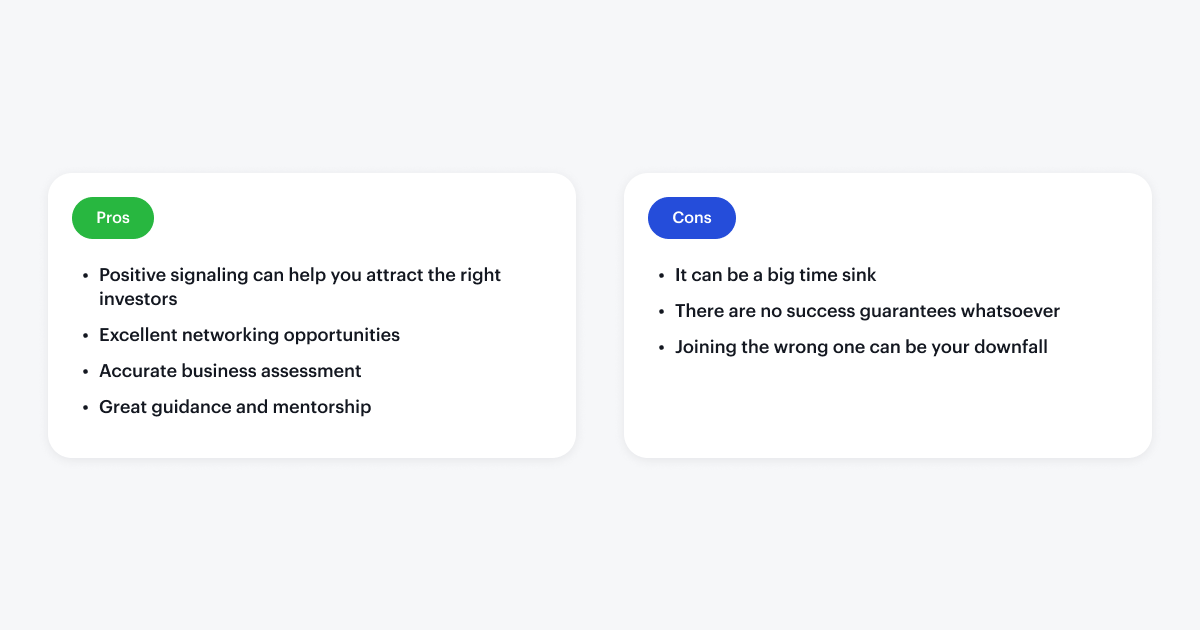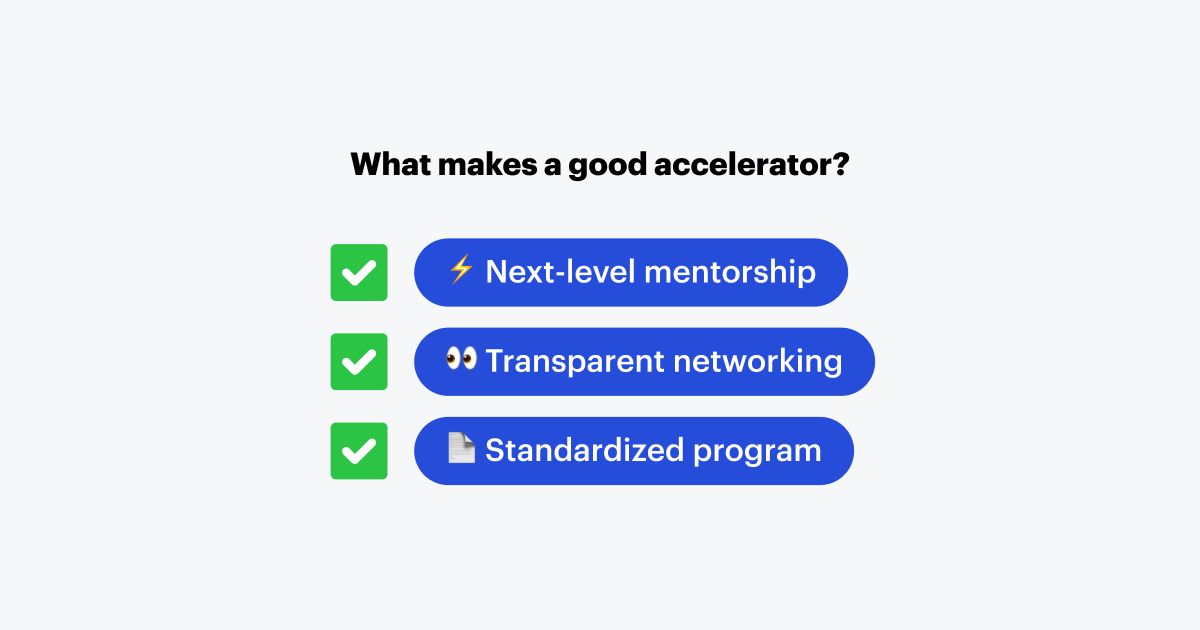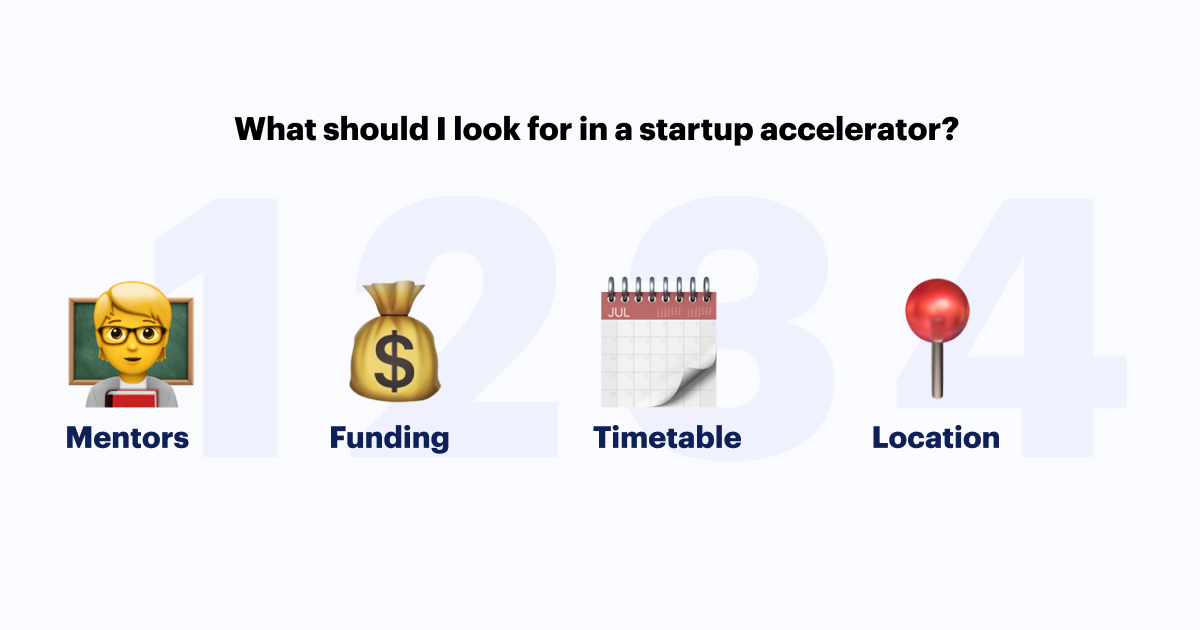Sadly, brainstorming about product or service ideas for a startup is just one side of every entrepreneur's story. The other side is more technical in nature and a lot more boring. It all begins with learning the business and the industry inside out and discovering your potential competitors and business partners.
If you are in the research phase, you've probably crossed your paths with the startup accelerator term more than once. You can see that a lot of entrepreneurs talk about it, addressing their concerns about whether to join one or not on forums and social media.
The future of your startup depends on your research and planning phase. You can feel under a lot of pressure. What should you do?
Here is everything you need to know about startup accelerators to be able to make an informed decision.
What is a startup accelerator?
Startup accelerators have enabled many successful startups so far. It is a program with a fixed duration ranging anywhere from 3 months to a year. A startup accelerator is developed to provide entrepreneurs with a number of benefits enabling them to excel at startup creation and launch. The benefits can include lots of things such as mentoring, education, and even financial aid.
The only problem with startup accelerators is that there are so many of those programs. Currently, there are over 7,000 business accelerators worldwide. The sheer amount of choices can be overwhelming, especially when you don't know what to look for. It is a big decision, and you should not take it lightly. Let's start with the pros and cons of a startup accelerator.
Should I join a startup accelerator?
This is a question that only you can find the correct answer to, and we're going to do our best to help you make an informed decision. At this point, it's important to note that if some startup accelerator worked for other startups, it doesn't mean it will work for you. We'll come back to it later. For now, let's focus on the upsides and downsides of joining a startup accelerator.

Pros
Positive signaling can help you attract the right investors—One of the most noteworthy benefits of joining a startup accelerator is getting your business idea and plan validated, especially by a leading accelerator program in your niche. It is a strong signal to investors that you've passed the proof-of-concept test, inviting them to trust your idea and invest money in your business.
Excellent networking opportunities—Participating in startup accelerator's activities will help you meet a lot of relevant people. Be it your fellow entrepreneurs, funders, or ex-funders, you will connect with individuals that can help you move your project forward. Networking during the startup accelerator programs can help you get some ideas and learn a great deal from your peers.
Accurate business assessment—Benchmarking your startup idea and plan is really hard because you don't have enough data. Joining a program can help you benchmark your startup against others in the same program. Just pick the startups in the same stage and check whether you are growing fast enough. You can also learn from other startups in the program, see how they approach problems, and what they do to stay ahead of the curve.
Great guidance and mentorship—Startup accelerator programs are not all about networking and fundraising. They are also developed to offer guidance and mentorship to entrepreneurs stuck in the startup creation process. Entrepreneurs who have no one else to turn to for advice, guidance, and mentorship find this benefit to be the most valuable one.
Cons
It can be a big time sink—Accelerator programs often include social events and meetings with mentors and other VIPs in the program. We are talking about hours spent in meetings and events. This big time sink can slow you down if you can't afford to waste time.
There are no success guarantees whatsoever—If you join a startup accelerator, there are no guarantees that your startup will be a success. It's important to know that these programs don't mitigate the risks of failing, whether it happens during or after the program ends.
Joining the wrong one can be your downfall—There is one sad truth about startup accelerators — they are not created equal. What does it mean? Simply put, some startup accelerator programs are better than others. It means they have better connections with investors, knowledge and expertise, and access to the right resources at the right time. If you join one with weak relationships with investors, you will have trouble jumpstarting your business idea.

What makes a good accelerator?
Knowing how to tell good from bad startup accelerators can help you significantly narrow down that thousands-of-startup-accelerators list you have. What makes a good accelerator, though? Here are a couple of things to look for to establish you are dealing with a capable organization.
Next-level mentorship
Given its many benefits, every startup accelerator has a mentorship program. However, not all mentorship programs are designed the same. A good accelerator has a robust mentorship program.
It should start from day one and help put entrepreneurs in a position to learn from mentors and customers. Introducing customers to mentorship programs proved vital for startup success as it enabled entrepreneurs to re-evaluate their ideas and come up with more effective ones.
Transparent networking
Good programs will ensure that you have access to all resources that can potentially help you succeed. It includes other entrepreneurs, their business ideas, and plans in the making. Programs that encourage entrepreneurs to share their ideas with others are potentially more helpful than those who value privacy above all else.
Standardized program
Finally, a good program is a standardized one. Few startup accelerators have access to the resources required to offer a personalized approach. Standardized programs work better as they cover more ground and enable organizers to rely on a well-established structure while planning and launching sessions with mentors and customers and events with investors.

What should I look for in a startup accelerator?
To be able to help you with your startup, an accelerator has to offer certain perks. You can find it hard to pick the right one when you don't know what makes one good and what makes one bad. Here is a short list of the most important things to look for in such a program.
Mentors
You should definitely look for mentors in a startup accelerator, especially if you have limited experience in the industry or target market. With the help of mentors, you will improve your business plan, products, or services.
Funding
Funding is not something that you should look for in an accelerator per se, as there are good equity-free accelerators in the market. But if you need the money, the funding option is no longer an option but a requirement.
The most important one, perhaps, is whether the accelerator makes follow-up investments as post-programs for startups can amount to a whopping $547K.
Timetable
Since time is rarely a commodity people can actually waste, you need to ensure that the startup accelerator offers a program with a timetable that fits your busy schedule.
Location
Unfortunately, some accelerators are only available to startups in certain geographies or startups targeting markets in specific geographies. Make sure to check it beforehand! Plus, you need to make sure that you can afford to commute or temporarily move to locations where the meetings and events will be held.
What things should I keep in mind when choosing one?
Now that you know what makes a good accelerator and what to look for in one, you should get on top of things to keep in mind when choosing an accelerator.
Niche
Every startup accelerator is niche-specific. It simply means that an accelerator should reflect your current needs. For instance, if you are launching a startup to target enterprise-level clients, you should look for programs in partnership with a major institution in the niche. In case you are targeting customers in an unfamiliar market, you need a program that can help you connect with relevant experts.
Does your accelerator understand your industry?
The accelerator you choose should be relevant to your industry. If you are into fintech, joining a program focused on cybersecurity is a waste of time.
Mentorship program and your startup phase
You won't benefit much from a program focused on helping you master your marketing ropes when you are just starting out. Make sure to check whether the mentorship program truly reflects your startup phase.
Finally, be direct! — Don't be afraid to reach out to an accelerator and ask them: "How can you support my growth?".
Pitfalls to avoid
While startup accelerator programs don't guarantee success, there are a couple of things you can do to mitigate the risks of failing. Here are the most common pitfalls you should avoid when choosing an accelerator.
Joining a program just because it's a trend in your niche — Every accelerator program is unique. You don't choose it just because it is trendy but to align what it offers with your business goals. Before you join such a program, you want to establish your business goals clearly and what you expect an accelerator program to help you with — remember, you want to get specific benefits from an accelerator.
Joining a program with no room in your schedule — social events, mentoring, and networking is time-consuming. Don't join a program if you have no time. Make sure that you and your team have room in the schedule before you commit. It ensures that everyone gets the most out of this unique business relationship.
Getting your business backed by an investor before discussing terms — Most startup accelerators work with vouched investors. However, you should not sign any contracts before you know the terms. Research your potential investors and accelerator program and ask them what they want in return for helping you jumpstart your company.
The success metrics are all over the board — as an entrepreneur, you should look at startup accelerators as a business partner. To ensure you are on the same page, you need to define the goals and objectives you are working towards achieving. You don't have to trust a program blindly when you have defined success metrics. You will be able to assess whether the program is helping you and to what extent.
Conclusion
Answering how to choose a startup accelerator is not an easy task, nor is choosing the right startup accelerator for your business. No one said it should be. That's how things go in the world of business.
However, with this cheat sheet, you will be able to be a better judge of those thousands of programs available to entrepreneurs. You will know which programs align perfectly with your business plans and goals, narrow down options, and make an intelligent choice.



